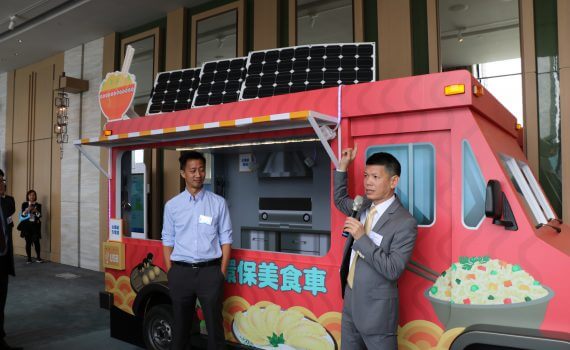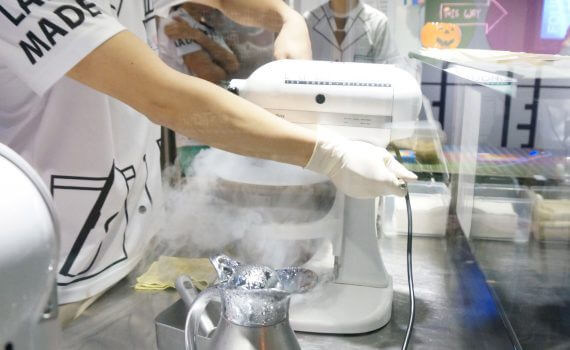Environment

New Fashion Trend: Generation Z Promotes The Rise of Second-hand Market
- 2020-12-16
- Culture & Leisure
- The Young Reporter
- By: CHAN Sze ChingEdited by: Eurus Yiu
- 2020-12-16
Nearly 30 people crowded in a 200 feet factory building units for buying clothes. Ms Athena Lau Ka Yi, an 18 years old secondary student, was holding four to five pieces of clothes in her hand, still looking for more items. Many young girls shuttled between the clothing rack, eager to hunt for treasure among the pile of clothes. In the crowded space, a secondhand clothing weekend market was organised, attracted many young girls, mainly 15 to 23 years old. There were over hundreds of clothes in the market. They all looked new, but were actually second-hand. Clothes were divided into different styles which all looked young and fresh, particularly targeting young customers. "It is so fun to shop here," Lau said, "whenever I find clothes I love, it feels like a treasure hunt." Lau enjoyed her secondhand shopping in this market so much, as the price was very affordable while quality was good. Most of them ranged from HK$50 to HK$100, some were only HK$30. "Lifexit" is the organiser of this secondhand clothing weekend market, who collaborated with three online secondhand shops, "Retrovert", "Asian Angel" and "Chan4room". Ms Coco Lam started up Lifexit to provide a space for people to relax and enjoy their peaceful moment. It locates at an industrial building unit in Kwun Tong, provides space to organise all kinds of activities. Secondhand clothing weekend market is a new try. "As I can see the secondhand clothing trend growing among young people nowadays, and the message behind buying secondhand is meaningful," Lam said, "that's why I organised this weekend market." She hoped, through this market, more people can get to know more about secondhand clothing culture in Hong Kong. Secondhand fashion trend is growing globally and rapidly. ThredUP, one of the largest consignment and thrift stores in …

Hong Kong's first solar-powered food truck wins catering award
- 2017-11-07
- Health & Environment
- The Young Reporter
- By: Holly Chik、Michelle NgEdited by: Choy York Borg Paulus
- 2017-11-07
Hong Kong's first green food truck won the Gold Prize of Catering in Traditional Cuisine of CLP's Greenplus Award Programme. The solar-power panels, which cost over $20,000, are installed on the vehicle's roof to supply electricity for fans and for customers to charge their electronic devices. "The eye-catching panels also demonstrates the eco-friendliness of the vehicle whereas other energy-saving measures are usually not obvious," said Trevor Ng, Managing Director of Pat Chun, who has been operating the $800,000 truck since March this year. The company also adopts an energy management system which can be operated with a smartphone to improve energy efficiency. "With the system, we can collect real-time energy consumption data and adjust the use of electricity," said Ng. For example, they can use the remaining heat generated by the automatic rice-fryer to cook their stewed beef brisket. To reduce interior temperature, they opted for a heat-resistant automatic rice-fryer. The solar panels on the roof also serve as a heat barrier during hotter days. A centrifugal range hood and a grease trap are also installed to collect used cooking oil that will be converted to biodiesel for the car. Ng said they save about 25% on their electricity bill after implementing these measures. Such environmental protection measures "mitigate climate change, lower business cost and create new business opportunities," said Philip Yung Wai-hung, Permanent Secretary for Commerce and Economic Development (Commerce, Industry and Tourism).

Walking in Hong Kong
- 2017-04-23
- Politics
- The Young Reporter
- 2017-04-23
It says something about the possibility of having a walkable Hong Kong when artificial grass mats, splash pools, picnic tables and benches were placed on what used to be a heavily-congested Des Voeux Road Central in September last year. The government is working with NGOs to turn roads into more pedestrian-friendly and it maysurprise many that the city is currently having seven full-time pedestrian schemes and 30 part-time ones. "Walking can be safe, comfortable and interesting," said Maura Wong Hung-hung, Chief Executive Officer of the independent public think tank Civic Exchange. "That's why walking is a pleasure and something that people enjoy, they don't have to depend on vehicles," said Wong. The "Walk in Hong Kong" initiative, proposed by the Transport and Housing Bureau, was officially announce in the 2017 Policy Address on January 18. It aims to promote walkability, which is related to connectivity of streets in Hong Kong. Working on pedestrian environment, the initiative will implement multiple new measures based on four themes. According to the Legislative Council Paper, it will provide user-friendly information on walking routes, enhance pedestrian network connection, make walking a pleasant experience and provide a safe and quality pedestrian environment. Civic Exchange introduced a new initiative in December 2016, "Walkability", to advocate walking in the city. The new initiative also encourages the government and different sectors to take a "people-first" approach in urban planning. For instance, meetings and seminars will be organized to foster citizens' understanding about the concept of walkability. "Pedestrian should play a priority role in the city's development, including the transportation strategy," said Wong. Civic Exchange also introduced the WALKScore in December 2016, a tool to measure walkability in Hong Kong. It takes into consideration the city's density, mixed-land use, constant traffic, hilly topography and other challenges. From its data, Mongkok …

Plastic free for marine creatures
- 2017-04-22
- Health & Environment
- 2017-04-22
The first thing Lin Guan Yi does in everyday morning is to open Facebook page and check orders for glass straws, yet she doesn't sell them for money. Instead, she sells glass straws for the turtles. Founded in 2016, 4theturtles aims for promoting glass straws to replace plastic straws. Lin, a financial manager, works part-timely for 4theturtles. This Taiwan-based environmentally friendly organization is encouraged by a popular YouTube video in which a turtle's respiratory tract is inserted by a plastic straw. Plastic straws and stirrers, along with other plastic products, are listed as top ten categories of coastal floating litter, according to a report published by World Wide Fund (WWF) Hong Kong. Marine litter has become a hit topic in recent years. In Hong Kong, there're at least more than ten non-profit organizations which have delivered this issue. Among them WWF Hong Kong plays a leading role. Started from 2014 by WWF Hong Kong, Costal Watch is a project providing a long-term resolution for marine litter. It focuses on analysing the importance of solving the marine litter problem and raising people's awareness of being green in order to reduce litter at source. In "Costal Watch – Turning Tide Against Marine Litter", its annual research report, WWF Hong Kong pointed out that plastic debris is a huge threat to marine ecosystems. The Coastal Watch team did surveys in cooperation with local fishing communities. They found that plastic debris makes up most of the marine litter found along Hong Kong shorelines. "The plastic debris could cause two problems. One is that marine creatures will be entangled by it. Another is that fish consumed plastic, which directly affects the health of the fish and the whole food chain, meaning that human health will be affected," said Yeung Chung-wing, Project Manager of Coastal Watch. …

Rough road ahead
- 2014-05-05
- 2014-05-05
Patients with physical disabilities face obstacles on their way to hospital due to the city's lack of barrier-free facilities.

A fancy or a fallacy?
- 2014-01-15
- 2014-01-15
Does this new way of making ice cream really save energy?

Urban tree management falls short of international standards
- 2013-11-15
- 2013-11-15
The absence of a centralised tree management system has prompted concerns over the varying standards for inspection of local trees.

A New Printing Dimension of Printing
- 2013-11-15
- 2013-11-15
Printing process steps into 3D world ... fascinating but not so green?

Harder to breathe
- 2013-03-18
- 2013-03-18
Walking through the thick blanket of translucent smog that enveloped the jam-packed thoroughfares of Sham Shui Po, Ms Wong Siu-bing was suddenly seized by an uncontrolled spate of heart palpitations.

